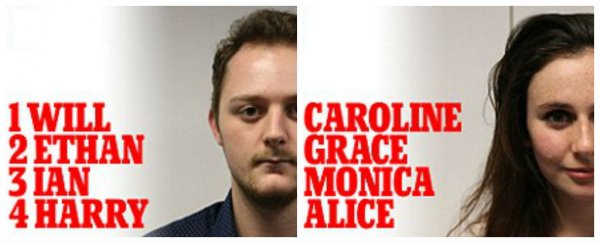Do people with certain names have certain types of faces? Quite possibility, researchers have found, after several experiments revealed a link between people with the same name and certain facial characteristics.
In a series of tests, the team found that volunteers were able to match specific names with strangers' faces more often than expected, so there could be typical look for a "Danny", a "Katie", or any other commonly used name.
The team from the Hebrew University of Jerusalem in Israel suggest that we might sometimes 'act up' to the way our name suggests we should. So maybe a girl named "Joy" would be more likely to grow up smiling to appear joyful – and also to get positive feedback about doing so.
"We are familiar with similar processes from other stereotypes like race and gender, where many times the stereotypical expectations of others affect who we become," says one of the researchers, Ruth Mayo.
"We hypothesise that there are similar stereotypes about names, including how someone with a specific name looks, and these expectations really do affect our facial appearance."
In one of the experiments, 121 Israeli volunteers were asked to match the correct name to 20 unfamiliar faces, out of a choice of five.
On the odds of probability, the participants should've hit upon the right name 20 percent of the time – one correct guess in five attempts. In reality, it was closer to 30 percent, and even higher in some of the other tests.
The experiment was then repeated with 116 French volunteers. This time, the participants were given a choice of four names for 10 strangers. Here, the success rate was just over 40 percent.
Here's are a few examples of the quiz:
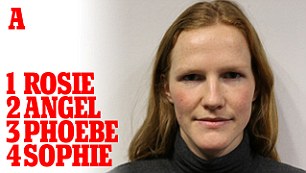 Correct answer: Phoebe. Credit: The Hebrew University of Jerusalem
Correct answer: Phoebe. Credit: The Hebrew University of Jerusalem
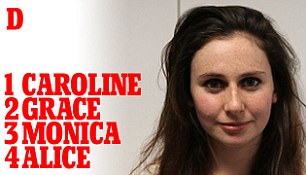 Correct answer: Alice. Credit: The Hebrew University of Jerusalem
Correct answer: Alice. Credit: The Hebrew University of Jerusalem
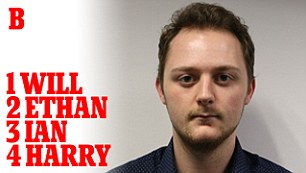 Correct answer: Harry. Credit: The Hebrew University of Jerusalem
Correct answer: Harry. Credit: The Hebrew University of Jerusalem
"We ran more than a dozen studies, and each time we had this feeling like, 'Oh boy, maybe this time it won't work'," another of the team, Yonat Zwebner, told Angus Chen at NPR.
"And each time, it worked. That was really surprising."
There are some limitations to this approach, such as the way the popularity of each name might have affected how often it was picked, but other researchers remain intrigued by the results.
"The phenomenon is there, I do think," psychologist Cathy Mondloch from Brock University in Canada, who wasn't involved in the research, told NPR.
Mondloch hopes other researchers will explore this area, saying the findings could provide a useful starting point for future studies.
Interestingly, test subjects were less accurate when picking the right name for people from another country, so it's possible that there's a cultural element to this ability too.
In addition to the human tests, the scientists trained a computer algorithm to study the appearance of 94,000 faces.
The software used 80 percent of the database to learn which faces went with which names, and tested itself on the other 20 percent to see if it could apply what it had learned.
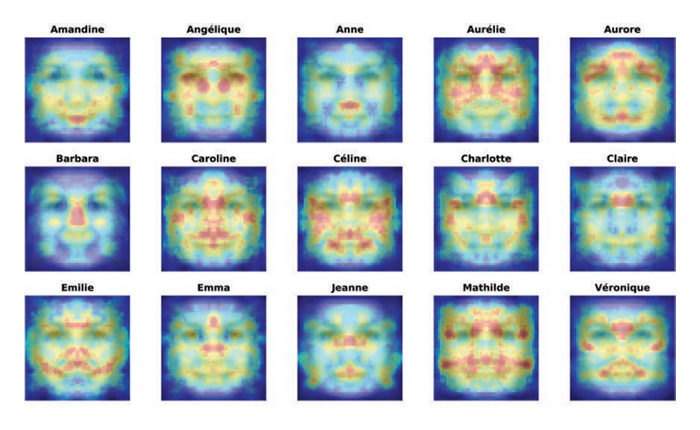 A computer algorithm found similarities between eye and mouth expressions based on name. Credit: Journal of Personality and Social Psychology
A computer algorithm found similarities between eye and mouth expressions based on name. Credit: Journal of Personality and Social Psychology
The computer had two names to pick from for each example, so should've guessed right for about 50 percent of the examples. In fact, it picked the right name between 54 percent and 64 percent of the time, depending on the names given.
That's not to say all Daves or all Rebeccas look the same, but it shows that there could be some kind of link between faces and names that we haven't quite figured out just yet.
Of course, despite the extent of the algorithm testing, this is just one relatively small study, so we'll need to see more research done before we can understand exactly what's going on here.
Plus correlation doesn't equal causation, so until researchers can come up with an actual explanation for the link, we have to remain skeptical that it's not just down to a coincidence.
For their part, the researchers think a sort of self-fulfilling prophecy might be at work, meaning we become whatever our names might suggest, even down to our hairstyles.
They suspect that some people abandon their first name for an alternative or middle name that "suits" them better, which could also enhance the link between names with appearance.
While it might seem a stretch to say we gradually grow to resemble what we think a Timothy or an Emily should look like, many studies have shown that names do have an effect on how we're perceived – so there are likely to be social expectations that we try to live up to.
"If this conjecture is valid, the association between faces and social perceptions could be a two-way street," the researchers write in their paper.
"According to this suggested process, people receive social signals related to their name, and they eventually come to look (to some extent) like their name as years pass."
The findings have been published in the Journal of Personality and Social Psychology.
